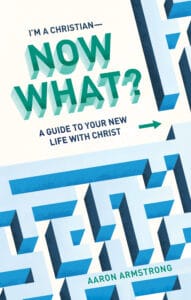
If you are a new Christian, you are on a new path. But where are you going and how do you get there? As an adult convert, Aaron Armstrong had to face these questions himself. Today, we interview Armstrong about his new book, I’m a Christian—Now What? A Guide to Your New Life With Christ.
Lexham Press: What inspired you to write this book?
Aaron Armstrong: After I became a Christian, the first thing I said was, “Now what?” I came to faith in a pretty dramatic way, and didn’t have any real church background, so I didn’t know what I was in for. I still remember what that was like nearly 20 years later. There were so many questions about big and little things and little things that turned out to actually be much bigger than I expected. Questions about everything from how to read the Bible and pray, to what my faith meant for my relationship with my then girlfriend (now wife), and what being a Christian meant for my bookshelves. It was a lot, as you can imagine.
So back in 2015, when I had been a believer for 10 years, I started reflecting on some of the questions I had as a new Christian and what I would have done differently… or, in many cases, wished I’d known sooner. Some of these became articles I published in the form of letters to a new believer. And as time went on, the sense of a “need” for something like what this book became kept growing, especially as I considered how much society has changed since the mid-2000s. For all Christians, the “cost” of following Jesus is always high, but it’s going to feel higher for many coming to faith today. They need guidance and encouragement as they grow—especially from someone who knows what it’s like to untangle some pretty tangly bits for the sake of following Jesus. Hopefully what I’ve experienced, especially the mistakes I made early on, will be a help to them.
For established Christians, especially people who have a heritage or legacy of faith within their family, helping and encouraging new Christians is going to feel overwhelming at times. They need encouragement to know that the issues people are dealing with now aren’t insurmountable. Sometimes all we need is a perspective shift to help us help others. And so I hope this book helps with that.
LP: Who should read this book? Is it only for new Christians?
Armstrong: This book is first and foremost for those of us who have recently come to faith as adults, particularly those without much or any familiarity with what Christians believe. But it’s also meant to be read by people who are more established in their faith, and not from a curiosity standpoint. Every single one of us is meant to make disciples—to help people who believe the gospel to grow and mature in faith, love, and obedience to the Father, Son, and Spirit—and this is a book that can help them as they try to carry out this calling in our particular societal and cultural moment.
LP: What sets your book apart from others for new believers?
Armstrong: I think the biggest difference between other books for new believers and this one is I think probably one of the most significant differences between this book and others like it is I was the person who needed a book like this one. And so it has a bit of a unique perspective because of it. It contains some essential theological truths and habits to grow in holiness, but it is much of an exploration of those—and their practical outworking—from a few steps back from where many books start.
For example, we want to encourage new Christians to read the Bible. We want them to develop a regular habit of prayer. But what is the Bible, and are you supposed to read it? What is prayer, and is there any specific language that we need to use—and why do people keep saying “just Father God” all the time, y’know?
I’m being a little glib, but you get the idea. We have to start by not assuming that people in our society have a shared understanding of these things. Most do not. And so we need to go back to the beginning, to lay a proper foundation of “whats” and “whys” before addressing all the “hows.” That, from my point of view, is the book’s greatest strength.
Aside from my controversial hot take on Tim Horton’s coffee, of course. (Read those footnotes carefully!)
LP: How does being a Canadian in the USA inform your perspective?
Armstrong: One of the virtues of being a Canadian in the USA is that I’ve seen a glimpse of the future. After all, Canada is about 20 years ahead on the post-Christian train than the United States, so if you look at a lot of aspects of Canadian society as a whole, you have a sense of where things are going here. As a result, I tend to be cautious about different issues being labeled as the greatest threats of our time. Many of those issues are very real problems, without question (even if some of the things American Christians treat as problems are actually not). But those real problems are expressions of our fundamental problem as human beings: how sin affects us personally along with our relationships with the world, other people, and with God himself.
I want to focus on addressing that deeper issue as much as I can, because that’s what will actually lead to people’s hearts and lives changing. It challenges us to show how Jesus is the answer to our deepest needs and greatest longings. It encourages us to rejoice alongside people who might think differently over the genuinely good, beautiful, and true that exists in the world—and allows us to cast a vision of our Creator as the source of all goodness, beauty, and truth. To be angry alongside non-Christians at the genuine evils perpetrated in the world, and help them to see that God hates evil and injustice even more than any of us ever could, and has done—and continues to do—something about it.
LP: What is the most important thing for a new Christian to know?
Armstrong: I think the most important thing for any new Christian to know is that there are going to be days when you wonder if what you’ve professed to believe is actually true. Where you’re going to doubt because things get hard, or because the excitement you had at the beginning has dulled. It’s okay to feel that way, because not everything is happy and shiny all the time. There will be days when it is really hard. When your faith is going to be challenged. Where you’re going to screw up and do the wrong thing. And there are even going to be times when just doing the basic things like reading your Bible is going to seem really really boring. And that’s okay. If you think about it like a mixtape or a good playlist, your life as a Christian isn’t supposed to be all rise. If everything sounds the same, it becomes monotonous and ignorable. It needs a mix of highs and lows, and midtempo songs too, because the variety is part of what makes for a compelling experience. So don’t be afraid of those things and don’t worry that something is wrong if you are having a low period, or things are just fine.
LP: What are some of the biggest challenges that new Christians face? How should they navigate these challenges?
Armstrong: I don’t know that there’s any one single greatest challenge for any new Christian. All of our challenges are going to be deeply connected to our own experiences. So when it comes to those things, whatever they are, I think the best piece of advice I can offer is to make sure that you have people in your life that you can talk to. More established or seasoned Christians who you can turn to for advice and prayer. Who want to help in whatever way they can—even when none of you really know what that means.
LP: How can seasoned Christians support new believers?
Armstrong: At my church, we describe our culture as one built on gospel, safety, and time. So we are focused on the gospel as our ultimate hope, our source of encouragement and joy, that through Jesus we are God’s beloved children (which is no small thing). We want to be a genuinely safe place to hurt, to heal, and to grow because of the gospel. And we want to be a place that gives everyone who walks in the door—no matter if they’ve been going to church from the day before they were born or it’s their first time ever visiting one—time and space for God to do what he wants to do in their lives.
That might seem like a strange way to answer your question, but if more seasoned Christians want to support new believers, we need to be focused on those things: gospel, safety, and time. If I can talk a little extra Christian-y, to be conduits of God’s grace for new believers. Invite new believers into our homes. Get to know them. Pray with and for them. Encourage them. Listen more than talk whenever you can. Help them to see that when the Bible describes the church as a family that it’s not just talk.
LP: Why are you an author?
Armstrong: I might need to back up a bit more, because it’s less about why I’m an author, and more about why I write. The short version is that I write because I always have. I’ve been writing and telling stories since I was about four years old, even though I never considered myself a writer per se, and certainly not a professional one. Despite dreaming of being a comic book writer/artist as a teen, and writing & illustrating a couple of stories that appeared in independently published anthologies in my early 20s, I didn’t have any real aspirations to make it my career either.
Then I found myself as the writer on a very small marketing team within a non-profit organization with no idea what I was doing.
So I learned by doing, writing for my job and then starting a blog—one that, to my surprise, people started reading. And equally surprising, it seemed to be helpful for the people who were reading. And that started to give my writing more focus, and my desire for writing clarity. Which in a roundabout way brings us back to the question: why do I write? I write because it’s a way for me to help people better understand what we believe as Christians and to grow in their faith. That’s ultimately the heart behind everything I write in any format. And if it helps someone know Jesus just a little better after reading, I am content.







